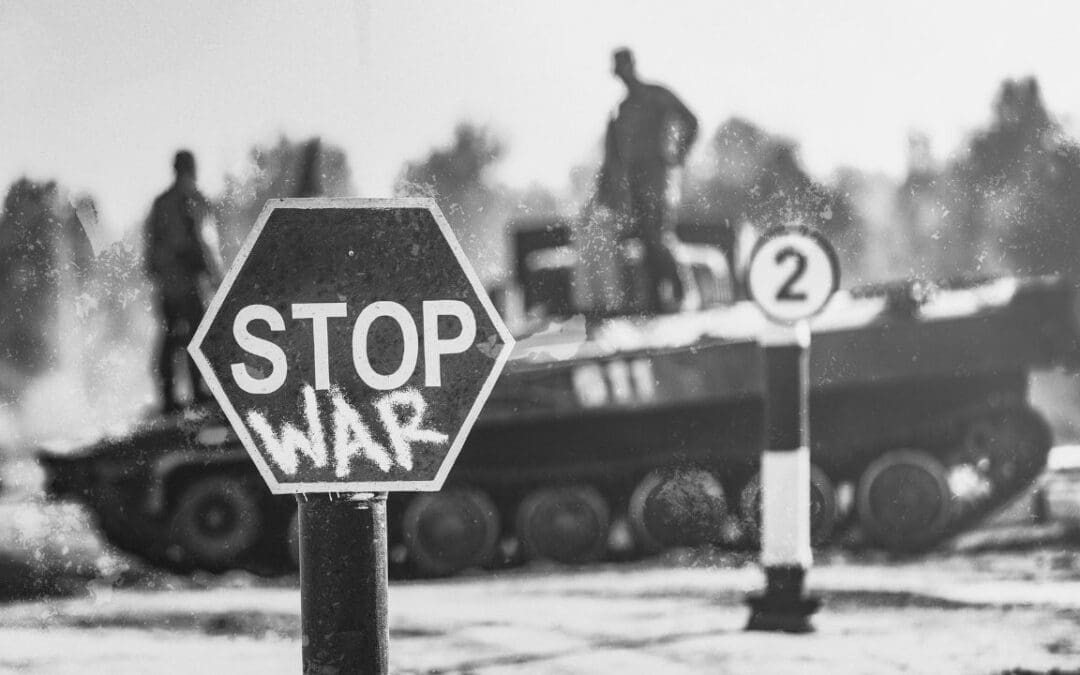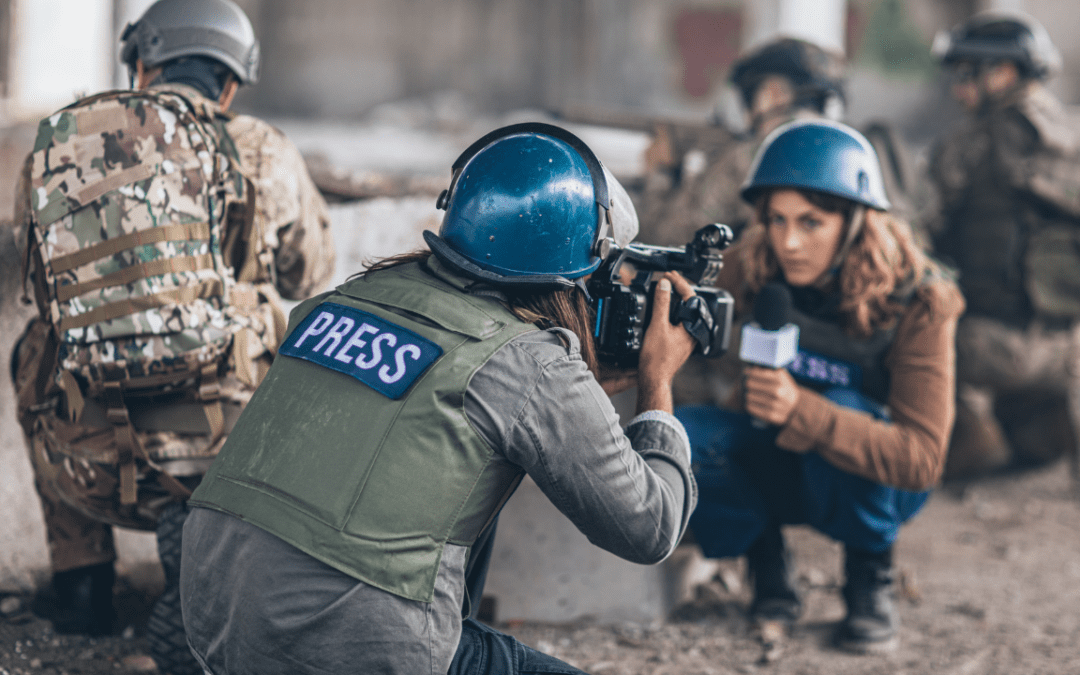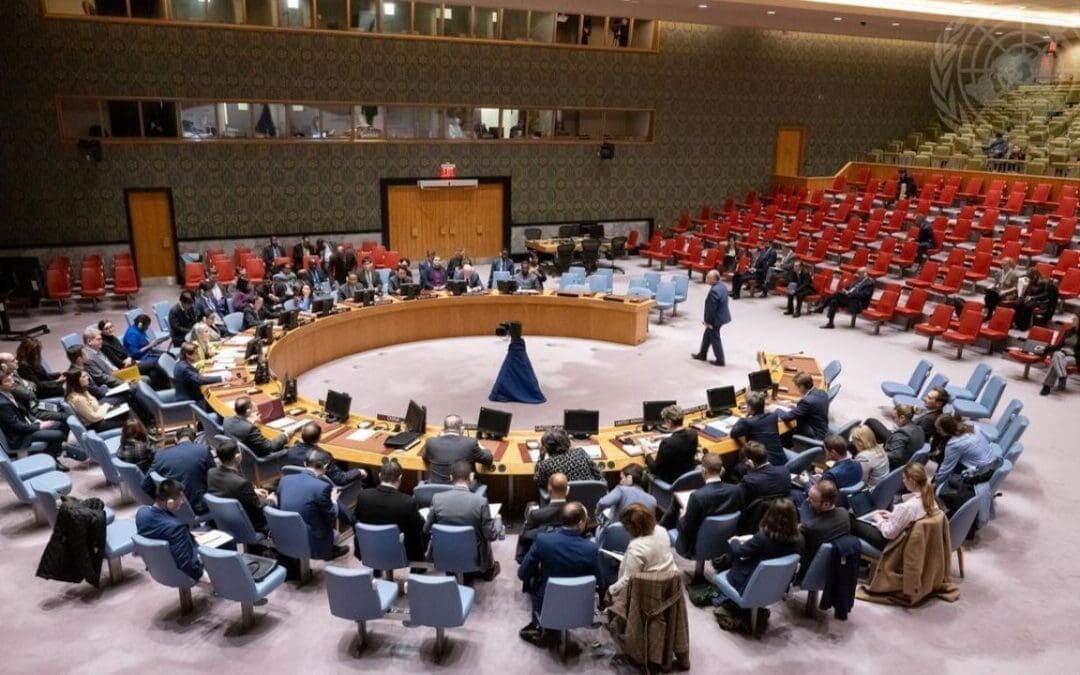
by Jerry Tetalman | Oct 14, 2025 | Peace, UN Reform
Since the Russian invasion of Ukraine, the major countries of the world have been aligning in two different blocs: NATO (which includes most European nations, the United States, and Canada), Japan, and South Korea, on one side, and Russia, China, North Korea, Iran, and India on the other. Both blocs of countries are supporting their side in the war with weapons, trade, or troops. The negotiations to end the Ukraine-Russia war have so far failed due to Vladimir Putin’s reluctance to engage. NATO has so far only supplied weapons and military support. Still, it has been careful not to confront Russia with troops directly―probably because Russia has a large nuclear arsenal and the United States and NATO are trying to avoid a full-scale war. This strategy, so far, has resulted in a protracted stalemate.
If allowed to spread and escalate, however, the Ukraine-Russia war might trigger World War III.
So, how does the United States deal with this dilemma? One option is to do more of what it has been doing: provide more weapons and sanctions, in the hope that they will bring Putin to the negotiating table in earnest. Another, more daring approach is to look at what causes war and then address the root cause of war.
We live in a world where most nations or groups of nations solve their disputes through military force rather than the force of law. But in some parts of the world, we have replaced war with law and government. For example, the European Union has created peace between its member states, such as France and Germany, countries that had fought bitterly against one another in World Wars I and II. Now these nations settle their disputes by voting in the European Parliament and the European Union courts.
Why has the European Union succeeded in creating peace among its members while the United Nations has failed in these efforts? The answer lies in the fact that the United Nations is based on treaty law, a voluntary system of agreements among nations that lacks an enforcement mechanism that true law uses.
A new, more powerful, and democratic United Nations, however, could create peace among the world’s countries. By convening a UN reform conference under Article 109 of the UN charter, it would be possible to engage the world’s nations in creating a rules-based system of international law that is enforceable rather than voluntary. Building a civilized world based on law and rules, rather than on military power, would create a global framework for peace, and hopefully, reverse the schism of the world into warring camps.
Would such a framework solve the Russia-Ukraine war? Not directly, but it would provide an institution capable of resolving it.
If left on their current trajectory, international relations and military conflict will soon reach a dark place that will be difficult to recover from. The alternative is not radical; indeed, rules and laws provide the basis of civilization, and today they are desperately needed at the international level. These can be provided by a structure of limited world government, similar to that of the European Union. Individual nations would remain free to develop their own laws dealing with their internal affairs, but, in international affairs, they would abide by the laws between countries. In this fashion, a small piece of sovereignty would be exchanged for a peaceful world.
The world’s nations can begin this process by invoking Article 109 of the UN Charter to call for a global conference to craft a new, more effective United Nations. For such a mission to succeed, many details must be worked out, but the alternative of more war and destruction is unacceptable.

by Jerry Tetalman | Mar 7, 2025 | Disarmament
The true challenge of our time is to bring rules, law, and democracy to the chaos of international relations. If we want to overcome the existential threats of nuclear weapons and abolish war, we will need a world governing body that is more democratic and empowered to act than the current United Nations.
The organized murder of one group of humans by another group of humans is called war. We live in a world where the vilest of crimes, which are punished with severe consequences within most societies, are somehow acceptable when committed as part of war. War has been an integral part of human history and, in the nuclear age, is the most imminent threat to our continued existence. As modern, civilized people, most of us find war abhorrent, but few of us call for the abolition of war or understand why war still exists in the contemporary world.
War exists because human society has been organized around the concept of the in-group and the out-group. The in-group could be a tribe, city, nation, or group of nations. The out-group may be tolerated, but in many instances, it is considered the enemy. The question of our time is, can we create a new story where humanity is the in-group? Can we civilize a lawless world by creating a basic system of enforceable global law?
Wars between countries continue because countries exist in relative anarchy at the international level. We have international law based on treaties that help maintain order, but this system is not an actual law, as it is voluntary. Valid law has consequences and enforcement mechanisms if one breaks the law. At the international level, we still live and die by the law of the jungle, which is “might makes right.”
The countries of the European Union have found peace after thousands of years of warfare and two world wars by trading away a piece of sovereignty to form a collective. They now resolve disputes in the European Union’s parliament and courts. The world’s countries can find peace by building an international union of nations and creating a similar system of courts and a global parliament.
The United Nations has a membership of almost all the countries on earth, and this in itself is an impressive accomplishment in that it creates an inclusive forum for discussion of international problems. Unfortunately, the UN lacks democratic standards and is flawed by its outdated design, and thus ineffective in addressing the major global security issues of our day. International security issues are dealt with in the UN by the Security Council and, in particular, the five permanent members who were the victors of World War II: the United States, the United Kingdom, France, the Russian Federation, and the People’s Republic of China. They each have a veto, allowing a single country to block the action called for by the majority. The General Assembly can pass resolutions, but they constitute no more than recommendations. The United Nations also suffers from a democratic deficit, as each member country has one vote regardless of population.
We are at a critical moment in human history. International laws exist, but they are often not enforceable. Force and military might still rule the world in terms of global affairs.
Fortunately, a US organization, Citizens for Global Solutions – like the World Federalist Movement, which brings together organizations with a similar orientation around the globe — works to create a world ruled by law rather than force to build the legal institutions necessary for peace and to abolish war. Citizens for Global Solutions is working to enhance the jurisdiction and use of the International Court of Justice to resolve disputes without violence in a campaign called Law, not War.
The challenge of our time is to abolish war and create the global institutions of law necessary to resolve disputes through legal, rather than lethal means.

by Jerry Tetalman | Jan 19, 2024 | Peace
The war in Ukraine has destabilized and polarized the international order. It pits two nuclear-armed superpowers, the United States and Russia, against each other. Any miscalculation can take all of us to nuclear Armageddon. This war has created untold human misery. Ending this war should be a top priority for humankind. How can the war be ended and on what terms?
Conventional wisdom holds that wars end in one of two ways. Either one side wins and the other loses or they negotiate a peace agreement by coming to an understanding that both sides can live with. The Russian invasion of Ukraine currently looks like a stalemate, with little territory being won or lost in the last year and both sides seemingly adhering to a position requiring total victory.
Russia seems to be playing the long game, of waiting out the resolve of the West to fund and support Ukraine. Sanctions on Russia have had an effect, but it still sells oil to China, India, and much of the world.
Ukraine’s goal is to regain its lost territory, maintain its current territory, and achieve security against future invasions. Russia wants to control all of Ukraine and wants to prevent it from joining NATO. The question is, can a peace agreement be made that both sides can live with?
Countries at war start to look for alternatives when victory is no longer assured or even likely. This war has reached that point. Negotiations give countries options in a no-win situation. Are the parties ready to negotiate?
Peace agreements are reached by making a win-win deal where both sides get something they want out of it. Of course, they need to compromise and give up some things as well.
Russian President Vladimir Putin is a key to any peace deal, for he must be willing to negotiate and implement any agreement reached. But the other key is Ukraine, whose territory has been invaded, occupied, and annexed by Russia.
The “deciders” will be Russia (essentially Putin) and Ukraine (the Zelensky administration). They will be the ones with representatives at the negotiating table.
Beyond “the table,” there are other influencers, such as those who support Ukraine with arms and funding–the European Union and the US. Some tacitly support Russia by continuing commerce with Putin and by not voting in the UN to sanction Russia.
If an understanding and peace settlement is to be reached between Ukraine and Russia, we must consider what institution is most capable of facilitating the necessary negotiations. The United Nations which is the world’s largest and most important international peace organization is the logical party, for this task, according to its charter, its goal is to “prevent the scourge of war.” Unfortunately, the UN Security Council is hobbled by the fact that Russia and the other great powers that emerged victorious in World War II―the United States, France, the United Kingdom, and China―exercise veto power. And Russia has vetoed Security Council action in connection with the Ukraine war.
Another option is for UN Secretary-General Antonio Guterres to organize serious peace negotiations. The role of the Secretary-General is that of chief diplomat for all nations. That official is charged with mediation and appointment of envoys to broker peace agreements. In getting such negotiations off the ground, he might find it useful to draw upon countries such as China or Turkey, both of which have a rapport with Putin.
The International Court of Justice was foreseen by the UN Charter as the primary method of resolution of disputes between Countries, offering law as an alternative to war. The law needs enforcement, and the ICJ is limited in this area. Its preliminary ruling against Russia, nearly two years ago, was ignored by Putin. The International Court of Justice has resolved the majority of the cases they hear through a voluntary agreement. If we are to move from an international system based on war and military force to a system based on law and justice, we need to empower and expand the International Court of Justice to include all nations in the UN.
We must also move forward with reform of the UN Security Council, thereby ending its paralysis when it comes to enforcing world peace and security. A more democratic United Nations, with greater funding and enforcement power, is necessary if we hope to survive this dangerous time. We can move from war to law by reforming and strengthening the United Nations, but it will take some creative thinking and action by all of us.
This article was originally published in Black Star News.
Image Credits: UN Photo/Manuel Elías




























